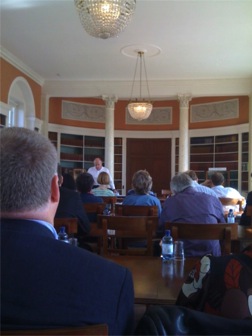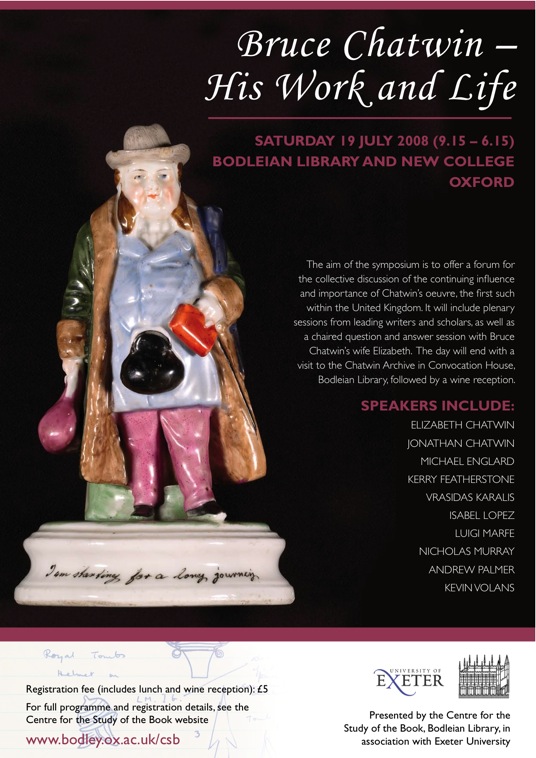Further Responses to Patagonia - A Cultural History
30/12/08 18:13
“Some readers will find it difficult to read any more about the region after being subjected to the work of Bruce Chatwin; In Patagonia was a brief success on its first publication. Happily, however, the canny Moss, who himself is a stylish writer, is not to be taken in. He calls the work perfect for an “exercise in self-promotion and reinvention” and his own book is the antidote for anyone succumbing to a bout of Chatwinismo and the ennui it produces.” From Hugh O’Shaughnessy’s article.
Comments
Patagonia - A Cultural History
30/11/08 18:11
Chatwin fans may be interested in Chris Moss’ new book Patagonia: A Cultural History. This from a review in The Daily Telegraph:
“[W]here the book is at its brilliant best is in its unfailingly perceptive analysis of those who have interpreted Patagonia, from the 19th-century ornithologist WH Hudson (one of Britain’s greatest nature writers) to the French philosopher Baudrillard. Moss rightly points to the sheer mediocrity of recent British travel writing on Chile and Argentina; but he is also critical of such hallowed names as Chatwin (“dated and dusty”) and the ever tetchy Paul Theroux, whose failure properly to engage with the region’s unpopulated expanses is perhaps indicative of his fundamental superficiality as an author.”
“[W]here the book is at its brilliant best is in its unfailingly perceptive analysis of those who have interpreted Patagonia, from the 19th-century ornithologist WH Hudson (one of Britain’s greatest nature writers) to the French philosopher Baudrillard. Moss rightly points to the sheer mediocrity of recent British travel writing on Chile and Argentina; but he is also critical of such hallowed names as Chatwin (“dated and dusty”) and the ever tetchy Paul Theroux, whose failure properly to engage with the region’s unpopulated expanses is perhaps indicative of his fundamental superficiality as an author.”
Articles of Interest
30/10/08 18:11
Two articles of interest over the past week or so; the first questioning famous authors on significant postcards they have received. Nick Shakespeare cites a card sent to him by Bruce Chatwin:
“I have this postcard of a Tiepolo ceiling in Wurzburg, that I was sent in 1987 by the late travel writer Bruce Chatwin, whose biography I wrote. He had driven to Prague in his 2CV with his wife Elizabeth in order to gather more material for his last novel, Utz. His German publisher who saw the Chatwins at this time had the idea that "after all the battle of life they would be together ..." I had the impression of a wonderful couple like Ovid's Philomen and Baucis.” See the card itself here.
Another relevant piece of news in this morning’s Guardian, namely an interview with Francis Wyndham, who was both a great friend and something of a mentor to Chatwin. Asked about what sort of person Chatwin was, Wyndham responds in glowing terms:
'I absolutely loved him. I found him life-enhancing. You wouldn't see him for ages, then he would just turn up. He was a bit like Jean [Rhys]; he would talk about what he wanted to talk about. It was a monologue, but it was a monologue that I wanted to hear.'
Finally, continuing a series of programmes on travellers of the twentieth century, Benedict Allen presents a documentary on the life of another great friend of Chatwin’s, Patrick Leigh Fermor. The programme is well worth watching in its entirety, but Allen does discuss Chatwin at some length towards the end of the show. It has passed by on mainstream television, but can be found for two more days on BBC iPlayer.
“I have this postcard of a Tiepolo ceiling in Wurzburg, that I was sent in 1987 by the late travel writer Bruce Chatwin, whose biography I wrote. He had driven to Prague in his 2CV with his wife Elizabeth in order to gather more material for his last novel, Utz. His German publisher who saw the Chatwins at this time had the idea that "after all the battle of life they would be together ..." I had the impression of a wonderful couple like Ovid's Philomen and Baucis.” See the card itself here.
Another relevant piece of news in this morning’s Guardian, namely an interview with Francis Wyndham, who was both a great friend and something of a mentor to Chatwin. Asked about what sort of person Chatwin was, Wyndham responds in glowing terms:
'I absolutely loved him. I found him life-enhancing. You wouldn't see him for ages, then he would just turn up. He was a bit like Jean [Rhys]; he would talk about what he wanted to talk about. It was a monologue, but it was a monologue that I wanted to hear.'
Finally, continuing a series of programmes on travellers of the twentieth century, Benedict Allen presents a documentary on the life of another great friend of Chatwin’s, Patrick Leigh Fermor. The programme is well worth watching in its entirety, but Allen does discuss Chatwin at some length towards the end of the show. It has passed by on mainstream television, but can be found for two more days on BBC iPlayer.
Bruce Chatwin Conference
30/07/08 18:10
Saturday’s conference was an enormous success, and one hopefully to be repeated next year. The conference enjoyed papers from Susannah Clapp, Kevin Volans, Nicholas Murray, Andrew Palmer and many others. See here for Nicholas Murray’s blog entry on the day, below for some photos, and stay tuned for further news from the day.






From WorldHum.com 'In Patagonia, In Patagonia' by Tim Patterson
17/01/08 18:09
Buying clothes pains me. I would sooner trek naked through a leech-infested jungle than shop for shoes. But somehow, over the years, I’ve amassed an extensive wardrobe of Patagonia brand clothing.
The fleece from an ex-girlfriend. The windbreaker I found secondhand. The ski pants I “borrowed” from my college roommate. The thermal underwear from Santa. The socks I treated myself to after three days of biking through the Chic Choc mountains in the rain.
Even my daypack is a Patagonia One Bag, with sealed zippers and a pocket that fits my laptop like a men’s R3 glove.
All well and good. Patagonia makes fine gear that blends form, function, corporate ethics and mountaineering chic.
But I wasn’t bound for the Rockies or the Alps. I was headed to the Andes. Patagonia—for six months. And here I was, looking as if I had just stepped out of a Patagonia catalog.
Como se dice ”tacky gringo”?
The Patagonia brand doesn’t distort Patagonia the place so much as it appropriates its image as a marketing tool, distilling stark mountains and outlaws and barren windy plains into a vague perfume of mystic coolness that makes yippies (yuppy-hippies like me) reach for our MasterCards.
Google “Patagonia” and the first result links not to a site about the place, but to the company site, where you can purchase jackets, shirts and footwear.
In the brave new world of a California-based search and technology information company, a California brand takes precedence over a place that is half the size of California.
As my red-eye to Buenos Aires taxied down the runway at JFK, I popped a sleeping pill and balled up my Patagonia fleece into a makeshift pillow. Just before passing out, a thought crossed my mind.
Was my trip nothing more than a logical extension of my brand identity? Did I buy my air ticket to the end of the Earth in the same way I might click on a text-link ad specifically targeted to my interests?
Was I following in the footsteps of Bruce Chatwin, or was I in Patagonia to make a fashion statement on a continental scale?
See here for the full piece.
The fleece from an ex-girlfriend. The windbreaker I found secondhand. The ski pants I “borrowed” from my college roommate. The thermal underwear from Santa. The socks I treated myself to after three days of biking through the Chic Choc mountains in the rain.
Even my daypack is a Patagonia One Bag, with sealed zippers and a pocket that fits my laptop like a men’s R3 glove.
All well and good. Patagonia makes fine gear that blends form, function, corporate ethics and mountaineering chic.
But I wasn’t bound for the Rockies or the Alps. I was headed to the Andes. Patagonia—for six months. And here I was, looking as if I had just stepped out of a Patagonia catalog.
Como se dice ”tacky gringo”?
The Patagonia brand doesn’t distort Patagonia the place so much as it appropriates its image as a marketing tool, distilling stark mountains and outlaws and barren windy plains into a vague perfume of mystic coolness that makes yippies (yuppy-hippies like me) reach for our MasterCards.
Google “Patagonia” and the first result links not to a site about the place, but to the company site, where you can purchase jackets, shirts and footwear.
In the brave new world of a California-based search and technology information company, a California brand takes precedence over a place that is half the size of California.
As my red-eye to Buenos Aires taxied down the runway at JFK, I popped a sleeping pill and balled up my Patagonia fleece into a makeshift pillow. Just before passing out, a thought crossed my mind.
Was my trip nothing more than a logical extension of my brand identity? Did I buy my air ticket to the end of the Earth in the same way I might click on a text-link ad specifically targeted to my interests?
Was I following in the footsteps of Bruce Chatwin, or was I in Patagonia to make a fashion statement on a continental scale?
See here for the full piece.